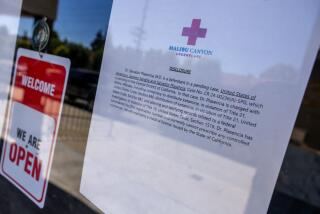Silver Lake doctor investigated in patient’s fatal drug overdose
- Share via
A Silver Lake physician who was found dead in his hot tub earlier this week was under criminal investigation in connection with his treatment of a 25-year-old patient who overdosed on prescription drugs, according to several law enforcement sources.
Authorities investigating Marc Abrams — well known in Silver Lake for his brisk and shirtless walks around the reservoir — conducted a series of undercover operations in which officers posing as patients were able to obtain powerful prescription drugs based on obviously questionable notes signed with names including “Dr. Kevorkian,” “Dr. Pepper” and “ Dr. Dre,” according to a law enforcement official who requested anonymity because he was not authorized to speak publicly about the case.
Abrams kept nighttime office hours and “catered to nothing but addicts,” the official added.
Authorities served a search warrant on Abrams’ office in North Hollywood last year, but the affidavit detailing the probable cause for the search was filed under seal. Investigators seized patient files, among other records, according to law enforcement officials.
The case was presented to the district attorney for potential prosecution, one official said, but no charges had been filed against Abrams at the time of his death, which is being investigated as a potential suicide, according to the Los Angeles Police Department.
A lawyer for Abrams said he was “a fine physician with an impeccable record” who had done nothing wrong. The lawyer, Michael A. Zuk, said he had no knowledge of any criminal investigation and had not been contacted by or spoken to any law enforcement agency on Abrams’ behalf.
Abrams “was a very popular figure — not some sleazy, shady doctor who was giving away scrips on the corner,” Zuk said. “He was a beloved figure in the community.”
The investigation began in the wake of the October 2008 death of a patient named Joseph Garcia, who died of an overdose of the painkiller Oxycontin, sometimes referred to as synthetic heroin. Other drugs also were found in his system. There is a thriving black market for such drugs, particularly among young adults, according to law enforcement officials.
Garcia’s mother, Lori, filed a wrongful death claim against the doctor last year, alleging that he was professionally negligent in prescribing drugs that resulted in the overdose. Garcia could not be reached for comment, but her lawyer, Robert Gibson, said law enforcement officials from “multiple” agencies had contacted her about the criminal investigation surrounding her son’s death.
A friend of Garcia’s told authorities that Abrams had freely prescribed drugs to people, requiring only that they provide some ostensible reason for needing them, such as a note from another physician, according to the law enforcement official who spoke on the condition of anonymity. He said the investigation confirmed the friend’s account.
“You’d spend 30 seconds with the doctor,” the official said. “This guy never conducted a medical exam. It was just blatant.”
Zuk defended his client as a physician who followed appropriate medical treatment guidelines generally and in the Garcia case.
“There was no inappropriate prescription given for either the quantity or the frequency” of the medications, Zuk said. “It was per guidelines for medical pain management, which is what he was being treated for.”
At the time of his death on Oct. 22, 2008, Garcia was living with his mother in Moorpark. He had been released from a work furlough program five days earlier after serving time for possession for sale of Oxycontin.
The coroner’s office ruled his death an accidental overdose.
A friend told investigators that he spoke to Garcia by telephone about 11:30 the night before his death and that his speech was very slurred, the coroner’s report said. The friend said that Garcia told him he had seen Abrams earlier that evening and had received a prescription for Oxycontin, the report said.
Abrams confirmed to the coroner’s investigator that he had seen Garcia about 7 p.m. the night before his death, the report said. He said Garcia had a history of back pain from an injury.
Abrams told the investigator that he had given Garcia prescriptions for Roxicodone, a version of oxycodone, and Soma, a muscle relaxant, the evening before he died, the report said.
Abrams told the coroner’s investigator that Garcia had never shown signs of medication abuse, the report said.
Zuk said he would expect the suit to proceed against Abrams’ estate. But, he said, it was unfounded.
“I am not going to say bad things about a grieving mother,” Zuk said. “It’s hard to lose your son. Some people have a hard time accepting what realities are.... But I think it’s misplaced trying to blame Dr. Abrams.”
Zuk said he last spoke to Abrams several weeks ago and believed he was in good health.
“I was shocked to hear the news,” he said.
City Councilman Tom LaBonge, who represents the district where Abrams lived, said he was shocked and saddened by both his death and the allegations emerging in the wake of it.
“It’s an absolute shock,” said LaBonge, who would routinely greet Abrams during his walks. “I’m very sad for the loss and for his troubles.”
Abrams’ widow, Cindy, did not reply to a request for comment.
Times staff writer Kate Linthicum contributed to this article.
More to Read
Sign up for Essential California
The most important California stories and recommendations in your inbox every morning.
You may occasionally receive promotional content from the Los Angeles Times.















